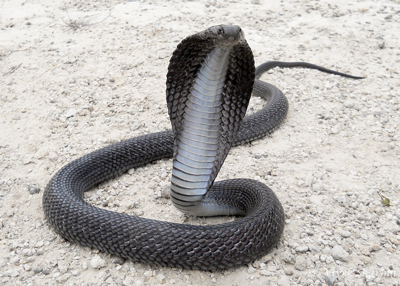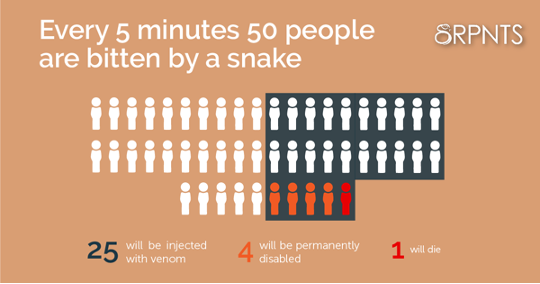September 18, 2020
International Snakebite Awareness Day 2020 – Introducing the SRPNTS Consortium
Raising awareness of one of the world’s biggest hidden health crises.
 Spectacled cobra (Naja naja). Photo by Vivek Sharma
Spectacled cobra (Naja naja). Photo by Vivek Sharma
Since 2018, International Snakebite Awareness Day (ISBAD) has been commemorated on September 19, representing an opportunity for us all to raise awareness of one of the world’s biggest hidden health crises. Each year, approximately 5.4 million people are bitten by a snake, of whom 2.7 million are injected with venom. Annually, this leads to 400,000 people being permanently disabled or disfigured and between 83,000-138,000 deaths, mostly in impoverished rural communities in sub-Saharan Africa and South Asia without immediate access to health care services and snakebite therapies.
The world produces less than half of the antivenom needed, and current snakebite therapies use 19th century technology that are often ineffective and expensive. The high cost of treating snakebite envenoming is unimaginable in most communities and puts too many at risk of economic peril. To stop snakebite, we need better science and political will to invest in next-generation snakebite therapies, with access and affordability at the forefront of any policy or program.
In 2018, IAVI joined the Scientific Research Partnership for Neglected Tropical Snakebite (SRPNTS), a consortium of partners in five countries, constituting a significant investment in snakebite therapy research. Funded with £9 million of U.K. aid from the U.K. government through the Foreign, Commonwealth, and Development Office (FCDO), SRPNTS seeks to develop novel, next-generation snakebite therapies with unparalleled efficacy, safety, and affordability to reduce morbidity and mortality of venomous snakebite with broad efficacy against multiple snakes, especially in sub-Saharan Africa and India.
This Snakebite Awareness Day, we encourage you to visit the SRPNTS ISBAD toolkit to learn more about snakebite and to meet our partners.
And for more information about broad access to monoclonal antibodies, read the Wellcome and IAVI report on expanding access to monoclonal antibody-based products, available here.
Watch below: Rob Harrison, Ph.D., head of the Centre for Snakebite Research & Interventions, discusses the SPRNTS consortium and its aim to stop snakebite by translating HIV antibody discoveries into next-generation snakebite therapy.
{modal youtube=”QiTt8tM6Cwg”}Prof. Rob Harrison on SRPNTS{/modal}
SRPNTS Partners
Centre for Snakebite Research & Interventions at Liverpool School of Tropical Medicine
Kenya Snakebite Research and Intervention Centre (K-SRIC)
Nigeria Snakebite Research and Intervention Centre (N-SRIC)
The Indian Institute of Science
Scripps Research
